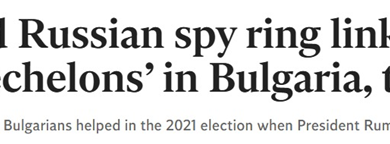Bulgaria’s Hybrid Democracy: A Fragile Link in Europe’s Eastern Flank
While attention focuses on visible flashpoints in Europe’s security architecture, subtler risks are emerging inside the EU itself. Bulgaria, formally aligned with the Euro-Atlantic community, is quietly developing a dangerous model of hybrid governance: one that blends nominal Western integration with systemic corruption and persistent ties to Moscow. This model presents a growing strategic vulnerability on NATO and the EU’s southeastern flank.
Surface Stability, Structural Fragility
A recent roundtable organized by Bulgaria’s Democrats for a Strong Bulgaria (DSB) showcased rare public dialogue among the country’s fragmented democratic actors. Such initiatives point to a latent civic potential that still exists within Bulgarian society. Yet the broader political landscape remains dominated by entrenched networks that operate with remarkable adaptability.
The so-called “backstage” establishment — oligarchic, corrupt, and opaque — quickly reasserts itself whenever democratic alternatives gain traction. Predictably, one of its preferred presidential candidates has now been activated, rehearsing the familiar playbook of Bulgarian populism: academic faces masking old loyalties, carefully choreographed rivalries that preserve the status quo.
The more visible threat of illiberal populism (exemplified by nationalist figures such as President Rumen Radev or pro-Russian leaders like Kostadin Kostadinov) is concerning but ultimately predictable, hence limited in damage potential. The deeper problem lies in the quiet evolution of a hybrid Europeanism: outwardly loyal to EU and NATO, but structurally compromised by deeply rooted Eastern, mostly Russian, dependencies.
The Energy Dependency Mechanism
Energy flows offer perhaps the clearest illustration of this duality. Officially, Bulgaria supports sanctions against Russia. In practice, however, it has emerged — relative to GDP — as one of the EU’s largest indirect financial contributors to Moscow’s war budget, largely via intermediated sales of Russian oil and gas. These flows generate up to $14 billion annually, providing Russia with vital foreign currency while circumventing the spirit of Western sanctions.
Support Independent Analysis
Help us keep delivering free, unbiased, and in-depth insights by supporting our work. Your donation ensures we stay independent, transparent, and accessible to all. Join us in preserving thoughtful analysis—donate today!
At the policy level, Sofia tacitly resists EU initiatives aimed at systematically phasing out Russian pipeline gas imports, while political figures with long-standing ties to energy and financial networks linked to Moscow continue to operate with impunity. Through opaque schemes — some reportedly financed via VTB-backed structures — Bulgaria seeks to facilitate the circumvention of sanctions on Russian gas entering the EU via Turk Stream, arguably the single most consequential sanctions measure capable of significantly impacting Putin’s war finances. These mechanisms often involve proxy arrangements with nominal Western investors, providing a veneer of legitimacy. This quiet subversion not only undermines the integrity of EU sanctions policy but steadily erodes trust in Europe’s collective strategic coherence.
The Threat to EU and NATO Integrity
For Western policymakers, this hybrid governance model represents a dual risk:
- Internal vulnerability — A member-state where democratic institutions are hollowed out, rule of law is selectively applied, and foreign influence thrives behind a pro-European façade.
- Strategic leakage — A gateway for Russian financial, political, and intelligence networks into EU decision-making processes, energy markets, and security debates.
Unlike open Euroscepticism, which remains contestable in the public arena, this hybrid model corrodes the credibility of the EU and NATO from within. It blurs the distinction between genuine Euro-Atlantic integration and transactional alignment, offering corrupt elites external legitimacy while preserving domestic impunity.
What Is at Stake
The real contest in Bulgaria today is not simply electoral — it is normative. Will EU integration continue to function as a mechanism for genuine democratic consolidation? Or will it serve as a legitimizing shield for oligarchic structures that quietly maintain Moscow’s leverage inside the EU?
Without stronger engagement — political, economic, and normative — from Brussels, Washington, and key Western capitals, Bulgaria risks becoming a textbook case of “institutional capture within the alliance,” offering strategic adversaries influence precisely where the West assumes it enjoys loyalty.
The EU and NATO have learned painful lessons about hybrid threats in Ukraine, Georgia, and the Western Balkans. They should not overlook similar dynamics unfolding quietly inside their own structures.
Ilian Vassilev




